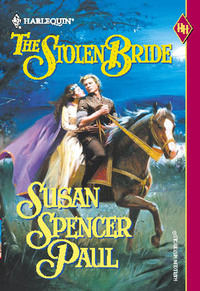Kitap dosya olarak indirilemez ancak uygulamamız üzerinden veya online olarak web sitemizden okunabilir.
Kitabı oku: «The Stolen Bride», sayfa 2
“No,” she murmured. “I’m merely weary, I thank you, Master Kayne.” She glanced to where a large iron pot sat on the ground near her feet. “I’ve brought this for repair. There’s a crack near the bottom. I pray you’ll be able to mend it.”
Kayne moved forward and knelt to examine the great black pot, tilting it up on one side and running a callused finger along the crack she’d spoken of.
“Aye, it can be done.” He glanced up at her. “Tomorrow, by midday? Will that be soon enough?”
“Yes. Thank you.”
She spoke so sadly, gazing at him with an equal sorrow, almost as if she might begin weeping any moment.
“You should not have come out in this heat,” he told her, rising to his feet. “I think you must be unwell, mistress.”
“Nay, I am quite well, Master Kayne.”
She set a hand to her shoulder, placing it carefully over the silk cloth loosely draped there, and slowly rose to her feet.
“I’ll take no more of your time,” she murmured.
“Allow me to convey you back to the manor house, milady,” Kayne said. “I like not the paleness of your skin.” He reached out to touch her arm. “’Tis easy to see that you are not well, even in this darkness.”
She flinched at his touch, making a sound of distress, and stepped back.
“My lady?”
“’Tis naught.” She pressed her hand against her shoulder as if to press a measure of pain away. “Forgive me, I must go.”
Head down, she tried to walk past him. Kayne stood in front of her to bar her way.
“Be still,” he commanded in a low tone.
He lifted a hand to pull away the delicate cloth draped over her shoulders, and she protested, “Nay, don’t!” and put her own hand up to grab his.
“Mistress Sofia,” Kayne said patiently, gently prying her fingers free. “I learned from you how to manage an unwilling patient.”
She looked away as he plucked the square of cloth aside.
Kayne was silent as he gazed at the brutal red scratches that marred her lovely skin, fighting hard against the fury that rose up at whoever had dared to do this vile thing.
“These are fresh wounds,” he said at last. “Perhaps made no more than an hour past. And you’ve not yet tended them.”
She would not look at him, almost as if she were ashamed. “I’ve had no time,” she whispered. He could hear the tears she’d refused to shed heavy in her voice.
“Nay, of course you have not,” Kayne said more gently. “You, who tends all the ill in Wirth almost before they’ve begun to sneeze. Come.”
He was careful to take hold of her other arm this time, but she resisted when he tried to pull her toward the nearby door that led from the smithy into his dwelling.
“I cannot,” she said. “My servants are waiting….”
Kayne refused to let her go, and firmly, though carefully, guided her toward the door. “They will continue to wait, pleased as they are with each other’s company. They’ll not worry over their mistress for a few spare moments—mistress, I beg you will not struggle so. I mean you no harm, and I’ve no intention of giving you insult, unless I must.”
She continued to struggle. Kayne bent and picked her up in his arms, easily carrying her past the door and into his home. He set her on the nearest chair he could find, next to a small table upon which an elegantly bound book of verses lay.
“If you run away,” he told her as he stood, his expression severe, “I will follow you to the manor house and demand of your father who it was visited this vile act upon you. And then I will go and deal with the man.” When she opened her mouth to protest, he added, “I give you my word of honor upon it, mistress, and I have never given it without keeping it.”
She shut her mouth and glared at him. Kayne moved away to open a chest near his eating table. As he began to dig through it, Sofia said, “You’ve no right to keep me here.”
“Just as you had no right to force me to your ministrations, when I had no want of them.”
“Is this some manner of revenge, then?”
“Nay, not in the least.” He lifted a small pewter jar from the chest before closing the lid. “’Tis merely thankful repayment. Like for like.”
Rising to his feet, Kayne fetched a bowl and filled it with a small measure of water, then found a clean cloth and tossed it over his shoulder and returned to kneel before her.
“Sit still,” he commanded. He leaned closer to examine her wounds more carefully, then lightly fingered her sleeve. “Pull this down a little.”
“There’s no need,” she told him, frowning.
He gave a light shrug and began to wet the cloth in the basin. “As it pleases you, mistress. The wounds will seep for a time, and your surcoat will be bloodied.” Gently, he began to bathe the long, red marks. “You’ve already lost another surcoat to these grievous wounds, I would wager.”
“Aye,” she admitted unwillingly. “’Tis soaking now, to remove the stains.” She sighed and began to unlace her gown. “Wait,” she said. He obeyed, and she loosened the top of the garment enough to pull the sleeve partly down. Her cheeks heated with embarrassment as the cloth revealed her shoulder and arm.
Kayne took note of her distress and kept his gaze impersonal as he continued to press the cloth against her skin.
“’Tis worse along the back of your shoulder,” he said. “Whoever did this possesses strong fingers. He dug deeply, intending to draw blood.”
“How do you know?” she asked, searching his face. “Could it not have been accidentally done?”
He lifted the cloth away, looking her full in the eye. “Was it?”
She was silent, as if she would not answer, but at last replied, softly, “No.”
Kayne expelled a slow breath, mastering himself. It was on his tongue to demand who the culprit was, but he knew that Sofia Ahlgren would never reveal such information. She was far too proud to speak of her private troubles. But Kayne had an idea who had committed the crime. Sir Griel Wallace, the lord of Maltane, had made his intentions to wed Mistress Sofia so clear that even a man who never heard the village gossip, as Kayne did not, would know of it. Kayne had met such men as Sir Griel before, and had no doubt that he was capable of every manner of cruelty, even to the woman he desired for a wife.
He reached to open the pewter box that he’d dug from out of the chest, dipped two fingers inside, and withdrew a small amount of a pale, white ointment. It smelled lightly of mint and honey.
“What is that?” Sofia asked as he began to apply it to the first angry stripe on her shoulder.
“Do you not recognize your own healing potion? You used it often enough on my burns, when I suffered them.”
“Oh, of course. How foolish of me.”
“You are quick to take care of all others, mistress, but not yourself. ’Tis clear that you stopped the bleeding and changed your bloodied clothes, but nothing more.”
“I’ve already told you that I had no time. There was so much to take care of in the village. So many chores.”
“Aye,” Kayne agreed. “I understand very well. It is easier, in such times, to push every thought and remembrance aside. To be done with it and go on.”
She lowered her head once more. “Yes, that is the way of it. I want never to think of it again. ’Tis foolish, I know, but it is my prayer, all the same, to forget entirely.”
Kayne smoothed the ointment with a delicate touch over each separate wound, making certain to cover them well.
“You’ll not forget. ’Tis an impossibility. But, in time, you may come to know that the fault was none of your own, and this will ease the memory.”
“I do not know that I will ever be able to do so,” she said. “I was headstrong, as I ever am. A grave sin and weakness, just as the priest has so often told me. I brought this affliction upon myself. That is the truth of it, and it cannot be forgiven.”
At this, Kayne ceased what he was doing and set his other hand beneath her chin, lifting her eyes to meet his own.
“It is hardest, often, to accept and forgive our own frailties. But harder still to claim ourselves as prey to another. You are indeed strong of will, Mistress Sofia, but sin or not, such as that does not give another just cause to inflict harm upon you. In this matter, you are fully innocent.”
He returned to his ministrations. Sofia remained silent.
When Kayne was done, he laid a thin, clean square of soft linen over the wounds, then carefully pulled Sofia’s sleeve back up. When she began to lace the top of her surcoat, he rose and busied himself with putting everything away.
“Thank you, Master Kayne,” she said, standing. “I cannot properly repay you for such kindness.”
Kayne closed the lid on the chest and stood full height, turning to look at her.
“There is no need. It was small service in exchange for all you did for me following the fire at Harold Avendale’s.”
“Nay, ’twas far more than that.” Lifting a hand, she gingerly touched the shoulder that he’d cared for, her beautiful face filling with indefinable emotion. He wondered if anyone had ever performed so simple a service for her before. Mistress Sofia was always the first one called upon when others were in need, always so strong and capable, even caring for matters that should have fallen upon her father’s shoulders. But perhaps no one ever thought that she might welcome help once in a great while, too.
“Thank you,” she said again, and abruptly turned and departed.
Kayne watched through the door that fell open upon her leaving as she made her way through the shadowed stable, her skirts swaying gently back and forth as she walked in her usual steadfast and upright way—the lady of Wirth again, and no one seeing her would ever notice that aught was amiss.
Chapter Three
A week passed before Sofia returned to the blacksmith’s shop, striding alone through the village in the late morning with a basket swinging on her arm.
She had dressed with particular care, glad to see the long, red streaks that Sir Griel had placed upon her finally beginning to fade. But she no longer looked at them with the same measure of fear and rage that had possessed her after Sir Griel’s unwelcome visit. Nay, not since that afternoon, when Kayne the Unknown had so kindly—and tenderly—cared for her, had Sofia looked upon the wounds in such a manner. Now, when she saw them, or ran her fingers across the healing scars, she did not even think of Sir Griel, but only of the blacksmith, his handsome face so close to her own as he bent over her shoulder, his warm breath caressing her skin, his white-blond hair falling forward over his brow…and, most of all, the sure, steady touch of his hands on her bare flesh.
Sofia knew herself too well to deny the truth of what she felt. She had begun to fall in love with Kayne the Unknown almost from the start, when she’d cared for him following the fire. She, who had seldom in her life even admired men—any of them—had found herself helplessly, and certainly unwillingly, drawn to the quiet, solemn, soft-spoken blacksmith. A man who was a mystery to one and all, who kept to himself and befriended no one, who was completely unsuitable in every way. Not that it mattered, for she knew that he felt nothing for her, nor for any of the village women who threw themselves so openly in his path. His kindness to her a week past had been only that—kindness, and perhaps a small measure of pity. He seemed to realize, when no one else did, how lonely and difficult her life in Wirth was.
It wasn’t that Sofia was unhappy with the lot that had fallen her way, but she did often wish that her father was possessed of a larger measure of courage, and a greater desire to care for his vassals and the people of the village. Sir Griel, being the most powerful lord for many miles, should have been the one to take a hand in caring for the local citizens, but he cared for no one save himself, least of all his own people or any of the villagers.
Since the age of ten and three, Sofia had been the only one to worry for the people of Wirth. She had gone to the nuns in the abbey and learned all that they knew of medicines and healing, she’d spent countless days beneath the instruction of her father’s steward, learning how the estate was managed, how the crops were grown, how the harvest was prepared and sent to market, and she’d relentlessly harried her tutors, all of whom she’d forced her father to hire, to teach her what a man must know in order to be a good lord. They’d not wanted to impart the knowledge to a mere female, thinking it far better that she should possess only those skills that a lady might require for the managing of a manor house, but Sofia had pressed until they’d all given way. She’d discovered, very quickly, what it was to fight and strive for every bit of knowledge she required.
But for all that she’d learned during the years that had passed between her thirteenth and nineteenth birthdays, Sofia had never known what it was to have soft, womanly feelings…until she’d met Kayne the Unknown.
They were strange and distressing, these emotions he wrought, making Sofia forget who she was and what her responsibilities were, and causing her to dream of things which could never be. She struggled to set such foolishness aside, to harden herself, but it was not so simple a task. Her mind obeyed, but her heart…ah, it was traitorous in every respect, and refused to believe that the impossible could not be overcome.
Still, Sofia was careful not to give it too much free rein, for love, she had found, could be far more painful than sweet. Seeing Kayne, being close to him, was painful indeed. He felt nothing for her beyond the quiet friendship that had grown between them during the weeks that she had cared for him, and even if he had, a woman of her birth and stature would never be allowed to wed a common tradesman, even one so skilled and unusual as Kayne the Unknown.
Sofia heard the sharp, distinct sound of metal striking metal as she neared the smithy, and stopped at the half gate to peer into the darkness toward that part of the building which housed Kayne’s working area. His tall, muscular figure was shadowed against the heat and light of the furnace as he bent over his anvil. Through the shadows, she could clearly see only his blond head moving up and down in rhythm with the hammer blows he dealt.
He was far too occupied to notice Sofia as she slowly and carefully opened the gate and stepped inside. Tristan, from his stall at the other end of the building, whinnied in greeting, and she cast a glance back at the magnificent black stallion. His presence was but the first of so many mysteries surrounding Kayne the Unknown. Only a knight or famous soldier would have need of such a horse, one trained in the ways of war or tournaments. Otherwise, such a beast was of little use—especially for a tradesman who would do far better to own a workhorse. Of course, Kayne the Unknown possessed other fine horses for different purposes, but a destrier like Tristan was expensive to feed and care for, and why a mere blacksmith should desire to spend good money on such an animal largely useless to him was beyond comprehension.
But that led to yet another mystery. Kayne was clearly possessed of greater wealth than he earned—or ever could have earned—at his trade. Sofia had seen for herself the manner of house he possessed, as fine as that of a minor nobleman with its wooden floors, Italian carpets and fireplaces with polished hearths. He had fine furniture, as well, which rivaled that of Ahlgren Manor. Hand-carved chairs and beautiful tables made of gleaming rosewood filled the dwelling’s lower room, and in his bedchamber abovestairs French clothing chests and a beautiful, tall bed with an expensive feather mattress graced the room.
Most intriguing of all, Kayne the Unknown possessed books. A book of common verse, a Book of Psalms, and a beautifully illustrated Book of Hours. They were the kinds of books that any wealthy person might have—Sofia’s own father possessed similar volumes. But far more amazing was what their presence revealed—that Kayne, a blacksmith, a mere tradesman, could read. And if he could read, then he had somehow been educated, and young men, even those learning a valuable trade, were seldom educated unless they came from a noble or wealthy family who could afford to hire tutors or buy their son a life in the Church. Boys apprenticed in a trade required only enough knowledge of reading and writing to sign their names. They would have little pleasure time for reading, and far less use for it. Kayne the Unknown, however, made great use of his rare skill. During the days while she’d cared for him, Sofia had often caught him reading, whiling away his confinement in bed.
She turned back to where Kayne yet labored over his anvil, his rhythm the same as it had been all the while since she’d first heard it, strong and steady. Hefting the basket she held a bit higher, Sofia made her way toward him.
Now that her eyes had become accustomed to the darkness of the stable, she could see that he was naked from the waist up, save for the heavy leather apron which hung from his neck and was loosely tied about his hips. It was much hotter on this side of the building. Intense heat emanated from the forge, fanning over Sofia like a hot wind as she drew nearer. Kayne was covered in sweat, his muscular chest and shoulders glistening with it and long strands of his blond hair sticking to his face and neck because of it.
He was a magnificent sight, so handsome and strong and fully masculine; a creature of power and beauty, just as his steed Tristan was, and impossible not to admire. Sofia remembered the days she’d spent tending him after the fire, of touching him and feeling the strength in the muscles that lay beneath his flesh. She had wanted so badly to run her hands over him for the sheer pleasure of it, but had refused to give way to such wanton, sinful desires. Kayne would have been repulsed by anything more than the most impersonal touch, and Sofia had already had a difficult time as it was in simply being allowed to tend the stubborn man.
As if sensing her approach, Kayne glanced up when Sofia was but a few steps away. The rhythm of his hammering came to an abrupt halt, hand midair, and he stared at her for a long, silent moment. Then, with a brief nod that acknowledged her presence, he returned to his work.
It didn’t take long. A few more strokes with the great hammer and he was done. Straightening, Kayne lifted a partly formed ax-head from the anvil with a pair of tongs, examined it, then carefully placed it in a nearby tub of water. The water sizzled and steamed, and then fell still. Kayne put the tongs and his hammer aside and, without looking at Sofia, walked to a worktable nearby where another basin sat. Dipping his fingers in, he scooped up several handfuls of water and splashed his hair, face and neck, shaking his head until water flew in every direction and coursed in small rivers down his chest. He took up a towel and dried himself. Then, at last, he turned to Sofia.
“Mistress,” he greeted in his usual solemn manner.
“Master Kayne.” Sofia gave a slight nod in turn. “I hope I do not disturb you in too important a matter? I meant only to render my thanks for the kindness you showed me some days past.”
He glanced at the basket on her arm.
“There is no need, just as I told you.”
She smiled. “I realize you desire no measure of gratitude, but I wish to thank you even in this small way.” She walked to the table and set the basket upon it, pulling away the cloth that covered the goods inside. “You see? ’Tis only a few sweet cakes and some tarts with pears and apples that our cook made yesterday. Nothing more sinister, I vow.”
“And this?” He tapped one long finger against the lid of a small pewter jar. Another similarly lidded jar sat beside it.
“Almond cream,” she said, distracted by the sight of his hand. “And currant jelly.” Those same strong fingers had touched her bare flesh, and so carefully soothed her pain. But on that day she’d been too mired in her own misery to care that his wounds were not yet fully healed. Now, she could plainly see that the burn scars were cracked and reddened from such harsh work.
“Kayne,” she murmured, reaching out to take his hand when he would have pulled it away. “You shouldn’t be laboring in this harsh manner so soon. Look at your hands. Merciful God.” She bent to take his other hand and lifted it up to examine. “Oh, Kayne,” she said unhappily. “’Tis bleeding here.” She gently touched one of the severest scars. “’Twill never heal properly if you do not take greater care.” Still holding his hands, she looked up at him, but the rest of the tirade set upon her lips died away.
She hadn’t realized how closely they stood together. So close that their bodies were almost touching. His face was but inches from her own, and his blue eyes were gazing down at her in a manner that made her heart leap within her chest. She had seen that look before on the faces of other men, most especially on Sir Griel’s, but never before had it produced such an effect on her. Instead of disgust, Sofia felt something altogether different, and far more alarming. Flustered, she released his hands and stepped away.
“Forgive me,” she murmured, busying herself with covering the basket once more. “’Tis none of my concern, though I dislike seeing my handiwork gone to naught.”
“As do I,” he said. “You seem much improved today. Your wounds are healing?”
“Yes, thank you, Master Kayne. Very much so. But I have not continued to neglect my wounds as you have done. You chided me for such only a week past.”
Kayne looked at his hands, flexing and unflexing the fingers. Then he gave a shake of his head and moved back toward the tub where he’d left his work cooling. “I do not have the luxury of being able to coddle myself,” he told her, using his tongs to fish the ax-head from the water, “nor have I ever done so. The scars will be with me all of my life, and both they and I must learn to live with this manner of labor.”
“You have many scars,” she murmured, watching him thoughtfully. She had seen the number of the wounds he bore while she’d cared for him. “Were you ever a soldier, Master Kayne?”
He glanced at her over his shoulder. “Aye, I was once. I fought in France for a time.”
Ah, Sofia thought with satisfaction. A small part of the mystery unfolded. He had been a soldier, and bore a soldier’s scars. But he must have seen many a battle indeed to be so heavily marked.
“Is that how you come to have Tristan?” she asked, then wished she hadn’t. He was a solitary man, and would not want to be plagued with such questions. Kayne the Unknown had made it clear since he’d come to Wirth that he valued his privacy above all else.
But he replied readily enough. “Tristan was given to me as a gift by a very great man…a knight of the realm.”
Sofia was astonished. “’Tis a fine gift, indeed. Did you save his life during battle?”
He was standing to the side, turned nearly away from her, but Sofia thought that she could see a slight smile on his lips.
“Nay, he saved mine.” He glanced at her again before lifting the ax-head higher into the firelight to examine it more closely. “The pot I mended for you has not cracked again?” He clearly wished to speak of himself no more.
“Your mending has held,” she said, “and will, I think, until the pot can no longer be used. ’Tis better than new, I vow.”
He uttered a laugh. “Nay, that it is not. I am not so skilled a blacksmith.”
“You are the finest blacksmith in all of Sussex,” she said chidingly, “and well you know it.”
Now he smiled—truly smiled—at her, looking so handsome and beguiling that Sofia found it necessary to draw in a deep breath.
“If you insist, Mistress Sofia,” he said. “’Twould be useless to argue with you o’er the matter, even at the risk of embracing false pride, for I’ve well learned that you will have your own way or none at all.”
Sofia smiled, too. “I have learned much the same of you, Master Kayne. But you’ve naught to fear in the matter of false pride. I have not overstated the matter of your excellence.”
He had returned to the working table and laid the ax-head upon it, beside an array of smithing tools. “You are very kind,” he said. “I shall pray to meet all your expectations.”
“Not mine, nay,” she replied at once. “You already labor far too long and hard.” She took a few steps about the large, airy building, admiring its cleanliness and purity of form. How different it was from what such places usually were—dark, foul-smelling and filthy. But both this building and Kayne the Unknown’s dwelling were open, spacious and inviting, always clean and in perfect order. “You are ever here in your smithy. Do you never have a day for rest and pleasure?”
“I need none.”
She turned to watch as he deftly prepared the ax-head for further work.
“You have lived in Wirth for fully a year now, yet you have never attended any of the fairs or celebrations. Tomorrow is Midsummer Day, and there will be much to do.” She took a step toward him, suddenly bold. “Come to the feast tomorrow and be merry for a few hours. Will you?”
Intent upon his work, he gave a shake of his head. “Nay, I’ve too much to do.”
“But you’ll have no custom brought to your door tomorrow,” she said persistently. “All the villagers will be there, dancing and feasting. ’Twill be a fine and pleasant day, I vow.”
“And you will dance around every bonfire once darkness falls, no doubt,” he said, still turned away.
The words—and what they implied—made Sofia blush hotly. A young woman seeking a husband would be married within a year if she but danced around seven bonfires on a Midsummer Night, or so it was believed. Sofia had ever scorned such tales, but Kayne’s speaking of it seemed to reveal some unspoken truth hidden away in her heart—one that she could not admit, even to herself.
“Nay,” she said firmly, pushing such foolishness aside. “I have no desire to wed.”
He put his work down and turned to look at her, surprise written on his handsome face.
“Never?”
She shook her head. “My father has too much need of me, as do the people of Wirth.”
His expression darkened. “You are unjustly burdened, Mistress Sofia. A woman such as you should wed and seek her own happiness.”
“It is not so easy a thing, Master Kayne,” she said with a weary smile. “But I am happy as I am. And content, in my own way.”
He was clearly dissatisfied by her answer. “What of Sir Griel?” he asked. “He has made it known to one and all that he will have you for a wife before the year has gone.”
Sofia tensed with anger. “I will never be wedded to such a man,” she vowed. “No matter what he may do to me, or how he may strive to terrify my father.”
Kayne drew nearer, searching her eyes.
“He’s the one who did this to you, is he not?” He lightly touched her shoulder, where her flesh had been scratched.
Sofia moved away, unable to tell him the truth of what had happened. No one outside of Ahlgren Manor knew the fullness of her shame, for her servants had remained loyal in saying little. But she knew that rumors were being whispered among the villagers, and feared that it would not be long before everyone knew Sir Griel had given her such grave insult. And once the truth was known, the citizens of Wirth would fear him even more than they already did. Sofia would have no one to turn to for help and protection.
“I have kept you from your work for too long, Master Kayne. Forgive me.”
“Sofia.” His hand curled around her arm, gently, holding her still. “I give you my word of honor that you can trust me, even if you can trust no one else. If Sir Griel has threatened you—”
“I’m not afraid of Sir Griel,” Sofia told him tautly, “or of any man.”
“You should be,” Kayne said. “He is a man of great cruelty, and therefore a man to fear. If he dares to set a hand to you again, come to me and I will deal with him, for your father will never do so.”
Sofia pulled free. “You are kind, Master Kayne, but I would not ask that of you. ’Tis too much, and you owe me naught.”
“For all you did for me after the fire,” he said, “I can never fully repay you. But it is not for that alone. I will not stand aside and watch any man bring harm to a woman. I have sworn before God that I would always defend—” He fell suddenly silent. “Only tell me if he should trouble you, mistress. Promise me that.”
Sofia touched her arm over the place where his fingers had curled, holding her in so careful a grasp. How strange he was! Had he sworn, as a knight did, to protect and defend women? But he had been a mere soldier. He’d just told her so.
“I will give you my promise,” she said slowly, “if you will promise to attend the Midsummer Day feast. And to dance with me.”
“I do not make merry,” he told her stonily.
Sofia gave a curt nod. “Then I will likewise make no promises. Good day to you, Master Kayne.”
“Good day,” he murmured, adding, before she could leave, “I will return the basket to you on the morrow.”
“I will be busy on the morrow. Dancing and feasting and having a fine day. And you will be here alone, as ever.”
He made a sound of aggravation. “Then I will return it the day following.”
“As it pleases you, Master Kayne,” she said, and turned to walk away.








